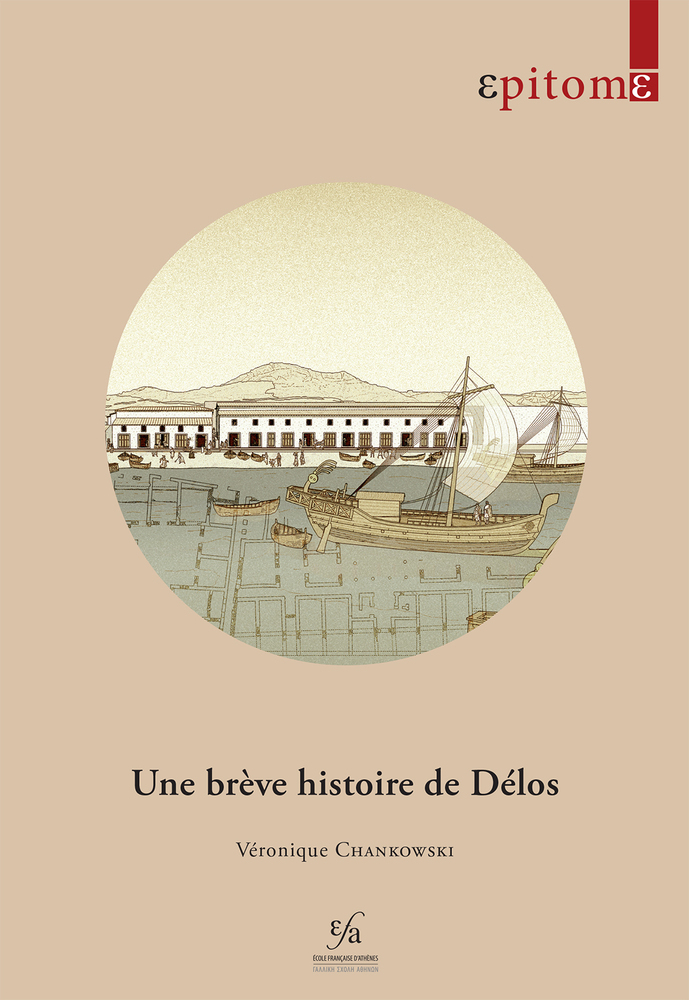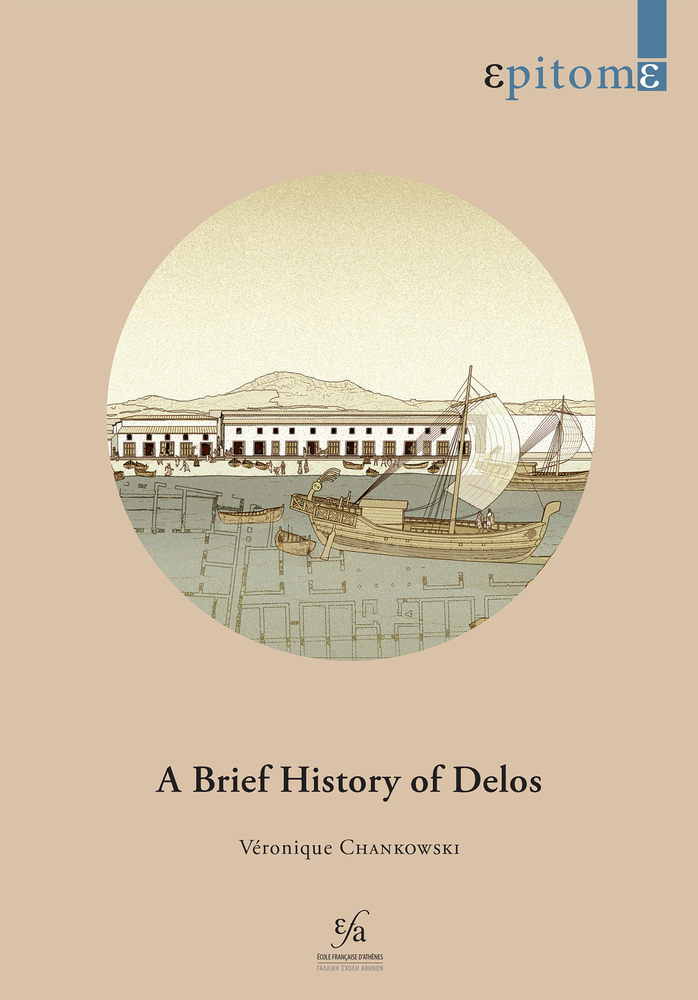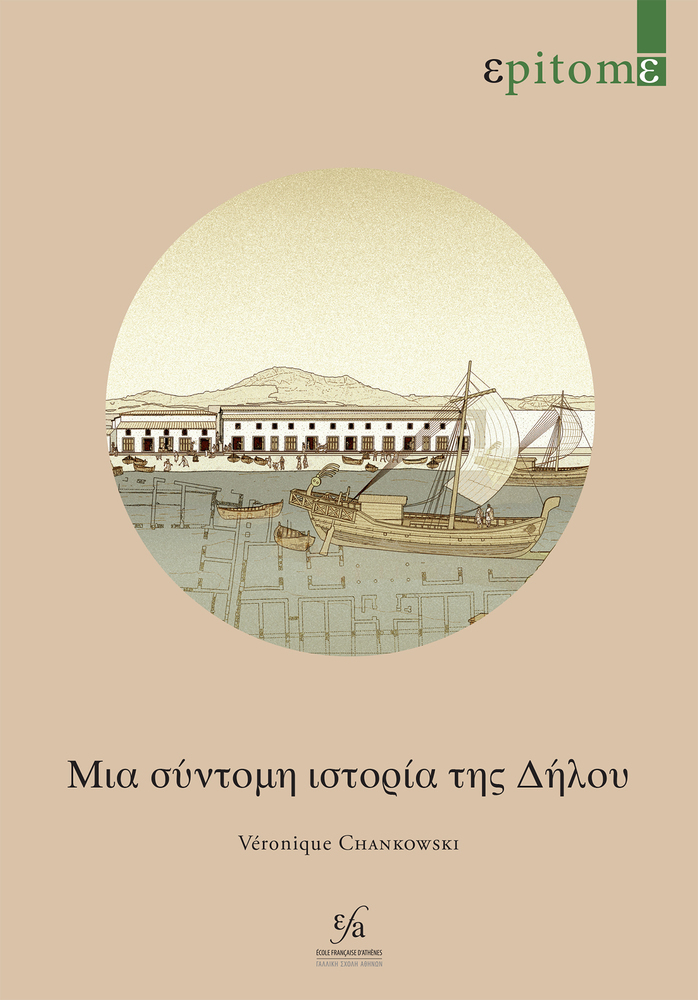Parasites of the God
Accountants, financiers and traders on Hellenistic Delos
65 €
Collection et numéro : BEFAR 409
Année de parution : 2023
Éditeur(s) : École française d’Athènes
ISBN : 978-2-86958-611-6
ISSN : 0257-4101
Largeur : 21 cm
Hauteur : 29.7 cm
Nombre de pages : 436
Distributeurs : Peeters
Langue : Anglais
Supports : livre broché
Published with the support of the J.M. Kaplan Fund
Freed from Athenian tutelage in 314 BC, at a time of geopolitical changes that marked the beginnings of the Hellenistic period in the Aegean world, Delos gradually consolidated its political and economic independence. During the third and second centuries, the Delian community redefined the central place that the island had continually occupied in the economic, financial and cultural flows of the Mediterranean. This study, mainly based on epigraphic accounting sources, including more than five hundred accounts and engraved inventories that were displayed in the sanctuary of Apollo, but also on numismatic sources and archaeological remains on the seafront, re-considers the question of Delos’ place in the Hellenistic economy. Far from being an exception to be excluded from serialized comparisons, the Delian evidence is indicative of Aegean economic circumstances and demonstrates the capacities of the Greek communities to adapt to change in troubled times. Behind the numbers cut in stone appear human communities and societies whose economic activities shed fresh light on the history of this part of the Mediterranean.
Véronique Chankowski is a former member of the École française d’Athènes and is currently its director. She is professor of Greek History at Lumière-Lyon 2 University. Her work explores the organization and practices of trade and the market in the classical and Hellenistic periods through the epigraphic and numismatic sources of Delos and other cities. She is the author of Athènes et Délos à l’époque classique. Recherches sur l’administration du sanctuaire d’Apollon délien (BEFAR 331) and of several studies on the economic history of the Greek world.
Freed from Athenian tutelage in 314 BC, at a time of geopolitical changes that marked the beginnings of the Hellenistic period in the Aegean world, Delos gradually consolidated its political and economic independence. During the third and second centuries, the Delian community redefined the central place that the island had continually occupied in the economic, financial and cultural flows of the Mediterranean. This study, mainly based on epigraphic accounting sources, including more than five hundred accounts and engraved inventories that were displayed in the sanctuary of Apollo, but also on numismatic sources and archaeological remains on the seafront, re-considers the question of Delos’ place in the Hellenistic economy. Far from being an exception to be excluded from serialized comparisons, the Delian evidence is indicative of Aegean economic circumstances and demonstrates the capacities of the Greek communities to adapt to change in troubled times. Behind the numbers cut in stone appear human communities and societies whose economic activities shed fresh light on the history of this part of the Mediterranean.
Véronique Chankowski is a former member of the École française d’Athènes and is currently its director. She is professor of Greek History at Lumière-Lyon 2 University. Her work explores the organization and practices of trade and the market in the classical and Hellenistic periods through the epigraphic and numismatic sources of Delos and other cities. She is the author of Athènes et Délos à l’époque classique. Recherches sur l’administration du sanctuaire d’Apollon délien (BEFAR 331) and of several studies on the economic history of the Greek world.
Introduction
CHAPTER 1 – THE SANCTUARY’S STEWARDSHIP RECORDS. ACCOUNTING METHODS AND ADMINISTRATIVE PRACTICES OF THE HIEROPOIOI
The establishment of a Delian administration
The Origins
The Athenian organization
The Independence of Delos
The Transmission of the Sacred Fortune
The recovery of capital
Recent debts or claims from Athenian times?
The role of the private fortune of the Delians
The financial policy of the city-state of Delos
The Authority of the Delian City-State over the Sacred Treasury
A question of aptitude?
Public borrowing
Loans to private individuals
The management of space in the organization of Apollo’s treasury
The Places Where Money Was Kept
The Artemision and the Temple of Apollo
Moving the funds
The question of monetary effigies
Forms of Storage
The Place of the Accounts
The accounting methods of the hieropoioi
The Hierarchy of Records
The deltos, a copy of the stele
The leukomata for the monthly accounts
The peteura for contractual operations
Papyrus sheets: the rough draft of the accounts
The account stele: a synthesis from several archival registers
From Cashiers’ Practices to Accountants’ Rationales
The formulation of account balances
Management of the accounting balance for the financial period
The major change in the years 230‑220 BC
Sacred Fund and Public Fund: From Separation to Accounting Summary
A genuine synthesis between the two funds
A necessary advancement in accounting methods
The invention of an accounting system
The change in attributions
“Double-Entry Book-Keeping”?
Awareness of the challenges of “double entries”
Multiple actors
Conclusion: The purposes of the accounts of the hieropoioi
CHAPTER 2 – THE SACRED FORTUNE: THE ASSETS STATEMENT
The growth of the sanctuary’s cash fortune
The Steady Increase in Funds
The amounts mobilized in the way of loans
The contribution of regular revenues
Building work
The Question of the Swelling of Cash Holdings at the End of Independence
The year 192 BC
The year 179 BC
The year 177 BC
The year 168 BC
The Assets Statement
The precious offerings
The Classical Treasure
The Treasure at the End of Independence
Variations in the Collection
The treasure at the beginning of Independence
The treasure in the mid-third century BC
Apollo’s fortune as financial power?
The Apportionment of Assets
Delian Apollo and the Other Gods
Hoarding and Circulation
Conclusion: The destiny of the Delian treasure under the Second Athenian Domination
CHAPTER 3 – THE COMPOSITION OF THE TREASURIES: ANALYSIS OF THE FUNDS
The sanctuary’s coined income
Own Resources
Other Revenues
Reselling
Offertory boxes
Fines
Subsidies and allocated funds
The Phiale
Subsidies for Festivals and Competitions
The prizes for the gymnastic competitions of the Apollonia
The wages of the flute players for the Apollonia
Expenses for the services of technitai at the Dionysian games
Thesmophoria, Posideia and Eileithyaia: subsidized festivals?
Choregikon
Prytanikon
Horoi and Trapezai
The endowment funds
The Donors
Management of the Capital
The Histiatikon Argurion
The composition of the funds
A fund of specific coins
The jars
Composition of the Sacred Fund from the Inventory of Jars
The Ancient Fund
The Money of Tenos and The Minoe
Technical terms
The money from Tenos
The money from the Minoe
The use of this money
The Other Jars
The Hoarded Entries
The public treasury
The Income of the Public Fund
Taxes
The pentekoste
The dekatai
The hypotropion
Stall fees
The agora rents
Loan income?
Judicial income
Revenues from funds and endowments
Spending from the Public Fund
Operating expenses
Diplomatic expenditure
Festivals
The oxen and the boonia
Public services
Public building works
The grain supply
The Organizing Principles of the Public Treasury of Delos and the Diataxis of the City-State
The apportionment of revenues
The temple deposit
Conclusion: Public property and sacred property on Delos
CHAPTER 4 – MONETARY POLICY AND CURRENCY CIRCULATION ON HELLENISTIC DELOS
The hieropoioi as money handlers: Monetary recycling in the sacred chest
Currency Changes in the Cash Holdings
The Evidence of the Inventories of the Second Athenian Domination
The Athenian administrators’ methods
The nature of the specie inventoried
The monies handled by the hieropoioi
The evidence of the account balances
Changes to the cash holdings
The role of the coinage of Alexander
Delian coinage
The Testimony of Coins
The Chronology of Monetary Issues from the Accounts of the Hieropoioi
The date of issue of the citharephorics
The date of the issue of the phoinikophorics
The consecration of dies
Metrology of Local Coinage
Accounting issues: the question of the artificial exchange rate of the Delian drachma
Hypothesis on the change in weight of the citharephorics
Changes in weights and measures in the Mediterranean as seen from Delos
The 12-Chalkos Obol
From the Amphora to the 12-Khous Metretes
From the Epidekaton to the Ephekton
Aegean Metrological Models from the Third to the Second Centuries BC
The citharephorics in the Aegean monetary landscape
The phoinikophorics in the Aegean monetary landscape
The Cyclades: “The Island Standard”
The Delian chalkou and its metrological challenges
Monetary circulation on Hellenistic Delos
The Testimony of the Treasuries
The Role of Bankers on Delos
Conclusion: An ever-changing monetary landscape
CHAPTER 5 – THE DELIAN ECONOMY: THE MARKET AND PRICES
The creation of a market
The Recording of Prices in the Accounts of the Hieropoioi: The Expression of Demand
The question of the state of the economy
The sanctuary’s influence
Difficulty with price analysis
The Organization of Procurement for the Sanctuary
Local stockists and suppliers
Provenance and transport costs: the organization of stocks
Pitch and oil
Tiles
Products imported from afar
The market for everyday consumer goods
Sacrificial animals
Timber
Price-Setting: Auctions and Bargaining
The challenges of resorting to auction
The hieropoioi as sellers
The hieropoioi as buyers
Price negotiations
The characteristics of the Delian market
The Continuity of Structures and Activities
The classical emporion
Population growth in the third century
Business Premises and the Interests of the Delians
The practices of the hieropoioi
Stockpiling outside the sanctuary
Competition among Delians
The City-State’s Policy
Price changes and redistributive commerce
The fight against speculation
The development of the Delian emporion
The Volume of Exchange
The Delian pentekoste
The Rhodian ellimenion
The Transit Trade
The clues from the grain trade
Slaves
The ateleia
The Commercial Infrastructures
The Agora of the Delians
The choma
The Facilities
The Storage Infrastructures
Conclusion: From the emporion to the free port
CONCLUSION
BIBLIOGRAPHY
APPENDICES
INDEX
LIST OF TABLES
LIST OF FIGURES
Lire sur OpenEdition : https://books.openedition.org/efa/16192
Dans la même collection
Des mêmes auteurs
Diffuseur(s)
Peeters publishers
61, Kolonel Begaultlaan
3012, Wilsele
Belgique
+32 16 24 40 00
Contact
Pour toute information - Πληροφορίες
École française d’Athènes
6, rue Didotou - 10680 Athènes
tel. +30 211 18 70 154










